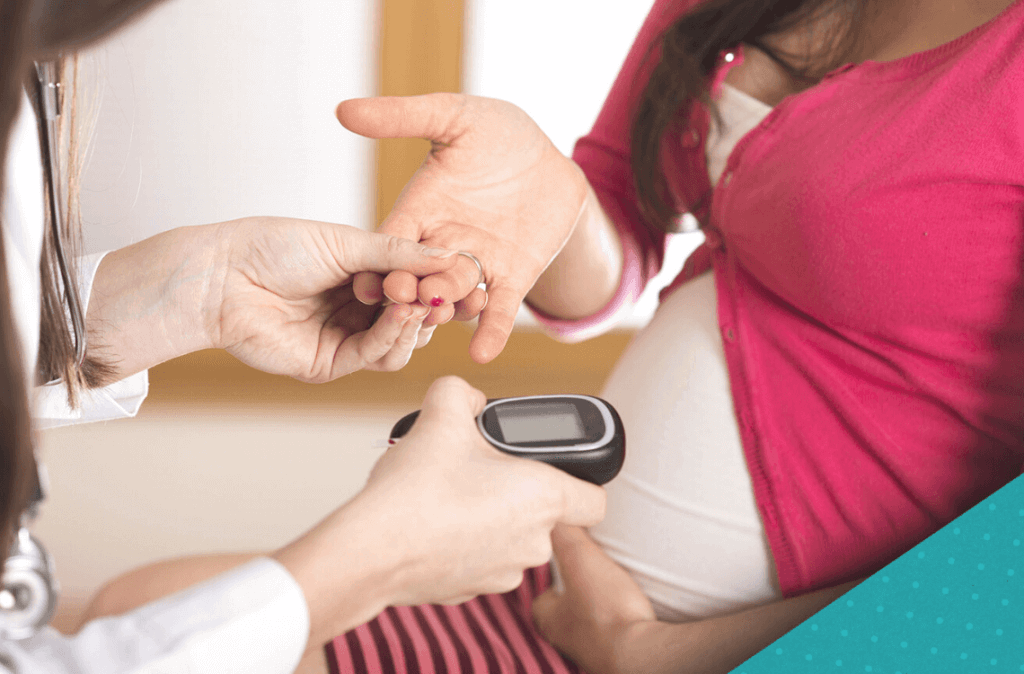What is Gestational Diabetes (GD)? GD is high blood sugar that develops during pregnancy and usually disappears after giving birth.
Gestational diabetes develops only in pregnant women who didn’t have diabetes before becoming pregnant.
5 Risk Factors of Gestational Diabetes
1. High BMI
If your BMI is higher than 30, before or during the 28 weeks of pregnancy, the chances of having GD is higher because it will increase the risk of insulin resistance.
2. Age
The risk of GD increases as the woman gets older.
3. History of diabetes
Women who have pre-diabetes symptoms before pregnancy will have a higher risk of developing GD. If you have a family member, such as, a parent or your sibling, who has type 2 Diabetes, your chances of getting GD increases.
4. Ethnicity
For reasons that aren’t clear, women who are black, Hispanic, American Indian or Asian are at higher risk to develop gestational diabetes.
5. Poly-cystic Ovary Syndrome (PCOS)
History of a polycystic ovarian syndrome (PCOS) is a significant and independent risk factor for the development of gestational diabetes. About 50 percent of women with PCOS experience metabolic disturbances, which is why they are often monitored closely during pregnancy to ensure that they follow a strict diet and do not gain too much weight.
4 Natural ways to manage GD
1. Balanced Diet
A low-carb diet rich in healthy fats and proteins helps to stabilise blood sugar, balance hormones, and decrease insulin resistance.
2. Physical Activities
A study found that taking just three short walks each day after meals were enough to help reduce blood sugar levels. In fact, those walks were just as effective over the span of 24 hours as a single 45-minute walk.
3. Stress Management
Specifically, mothers who experience an increase in their stress levels from early to mid-pregnancy have 2.6-fold increased odds of developing gestational diabetes. To manage the stress level, the pregnant mother should make a small lifestyle change like walking around outside every day, doing yoga or meditation, and using lavender oil to help you relax and to reduce stress.
4. Supplementation
Getting some sunshine and supplementing with cod liver oil can help boost vitamin D levels. Supplementing with chromium, a necessary mineral that helps metabolize carbohydrates may also be beneficial.
Do visit motherhood.com.my for more articles that you should not miss!
If you have been diagnosed with GD, strongly recommend you should work together with the healthcare supporter such as nutrition expert or dietitian to have a proper meal plan for you during the pregnancy to avoid any complications.
To find out more or to hear what other mothers had gone through, join our Women Wellness Blueprint workshop that is happening in Kuala Lumpur. The next session is on the 12th of August 2018 from 8am – 1pm! Find out from Motherhood.com.my for the next date or enquire from wwb@flexmobstudios.com.
If you have any further inquiries, please feel free to drop us a text on Whatsapp at 012-2170391 – Lavinia, or Email (wwb@flexmobstudios.com).
You can visit https://www.flexmobstudios.com/wwb or enquire from Motherhood.com.my.
